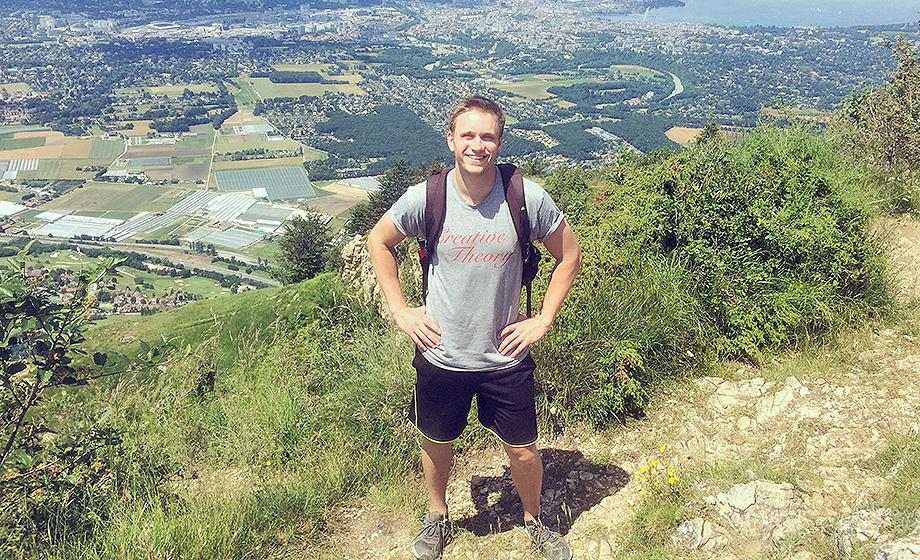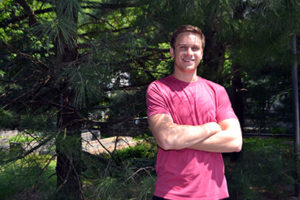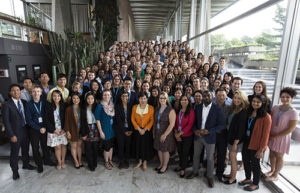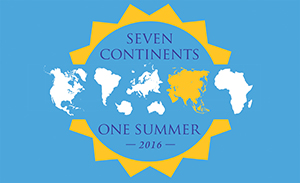
How do you graduate from a small high school in Granby, Connecticut, and end up conducting research on Zika and other epidemics at the World Health Organization in Geneva, Switzerland?

If you’re Aaron Johnson ’15, M.S.P.C. ’16, you do that by gaining experience in marketing communications and living and learning alongside people from all over the world at Clark University.
After graduating from Clark’s fifth-year accelerated master of science in professional communication program in May, Johnson headed to the World Health Organization (WHO) as a communications intern.
“My time in Geneva has been an amazing experience,” he says. “It is really quite interesting being surrounded by all of the United Nations activity going on.”
Johnson has used not only the research skills and knowledge he gained in graduate school, but also what he learned in his undergraduate coursework as a communications and culture major.
His experience outside of the classroom also came in handy. As an undergraduate, he honed his communications skills by co-hosting the “Put Me In Coach” sports talk show on Radio of Clark University and interning with Clark Athletics. In graduate school, he worked with two other students to develop a strategic marketing and social media plan for Worcester Soccer House, Started by Mohamed Elmaola ’18, the organization offers free soccer activities for low-income children and middle schoolers.
In addition, Johnson lived for two years in a house full of students from Zimbabwe, Morocco, Pakistan, Brazil, Israel and the United States. A longtime soccer goalie, he played and coached club soccer at Clark, and came to appreciate the more individualized, stylized moves of players from outside the States – and enjoying playing with them in the world’s most popular game, one that crosses cultures, languages and borders.
“Intercultural communication is something that I’ve experienced at Clark, and that’s been an amazing experience. Most of my friend group has been international,” Johnson says. “When I think about the people I’ve met through playing soccer, and the experiences I’ve had, I realize it really shapes you.”
He fused his personal experience with his research interests through a graduate intercultural communications course with John Chetro-Szivos, associate dean of professional studies and online education. It was Chetro-Szivos who suggested that Johnson pursue the internship with the WHO.
When Johnson arrived in Geneva in June, he went to work for the communications department of the Essential Medicines cluster. He co-developed the first social media plan for Essential Medicines and helped write part of an official report on communications for the Global Action Plan for Influenza Vaccines conferences.
He also conducted research for the Research and Development (R&D) Blueprint department. R&D Blueprint, a global strategy and preparedness plan, emerged from the WHO’s experience with the Ebola outbreak in 2015. With hard lessons learned, the organization reshaped its response to epidemics, and is now tackling the Zika virus. R&D Blueprint allows the organization “to fast-track the availability of effective tests, vaccines and medicines that can be used to save lives and avert large-scale crisis,” according to its website.
A Q&A with Aaron Johnson
Below, Johnson talks more about his WHO internship and what he hopes to do in the future.

Tell us about some of your projects this summer.
I started by writing a feature story for the Essential Medicines website on a partnership conference in Ethiopia that was taking place during my first week. I then spent the next week working on analytics for the Essential Medicines website, developing a report to be presented about site traffic and trends.
Next, I continued to write stories for the R&D Blueprint website and also updated the fact sheets used on the WHO website to inform people about diseases, medical products, practices and the industry in general. This requires interviewing focal points ‒ the people responsible for coordinating various WHO activities ‒ for each topic and then updating the fact sheets in terms of language and data.
I also published an article about Zika R&D on the Blueprint Website.
How are you putting your research skills to work?
For the articles and fact sheets, I have been writing. A big part of the work is interviewing focal points for the stories and topics to get the background on the topic and any updated information that is important to include. This definitely has incorporated many of the skills I learned through my work at Clark, from classes related to journalism and communication primarily.
What have you learned in your internship – especially about the WHO’s role in curbing epidemics like Ebola and Zika?
I’ve learned a lot about how the UN system works. I have also been immersed in a new system of technical writing that I didn’t experience in previous internships or my coursework. A lot of what I have to do is take medical jargon and produce a document that is interesting and relevant to the general public.
I have learned a lot about the response process WHO takes to major epidemics like Zika and Ebola. There are a lot of steps that go into diagnostic work, vaccine development and even communication of protocols and relevant information about such epidemics. Although it is important to get a vaccine and viable information out about the diseases like Zika, it is also crucial that such measures and actions aren’t rushed. There is a fine line here that you don’t really see and appreciate from outside of the organization.
Who are the other interns?
There is a large number of interns from all over the world. People come and go, as everyone has a different internship contract, some for six weeks, some for three months. The intern communication system is great and allows for interns to meet and get together all the time. There are scheduled seminars a few times a week during the lunch hours where interns can learn about different departments within WHO and current research being done. Typically, interns also get together at bars around the area at night as well through Geneva Intern Association events.
This story is part of our 7 Continents, 1 Summer series, which highlights the interesting work that Clark students, faculty, alumni and staff are doing all over the world.
How did your Clark undergraduate and graduate degrees prepare you for this?
Clark prepared me for this experience primarily through my exposure to different cultures and communicating with people from many different backgrounds. In many ways, this is the greatest part of my Clark experience. But I also felt prepared through my coursework in my graduate program. John Chetro-Szivos, who introduced me to the internship opportunity, helped to really prepare me in terms of my understanding of professional communication.
What do you plan to do after your internship ends?
I’m looking at organizations that do work in sports development. There are a lot of nonprofits popping up that help people who are in unfortunate circumstances learn life skills through soccer.
After this internship, I plan to come home and try to take what I have learned here as well as through Clark and apply that to a future job experience. I have had an incredible opportunity here in Geneva to network with people throughout the United Nations system. I hope to take what I have learned from people I have met, and my work experience, and combine my interest in health with my interest in sport to become a positive force in the world.
At top: While in Switzerland, Aaron Johnson hiked up Le Salève, a mountain on the French border; here, he had a view of Geneva and Geneva Lake (Lac Léman), on the edge of the Alps.



